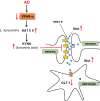The Novel Role of PPAR Alpha in the Brain: Promising Target in Therapy of Alzheimer's Disease and Other Neurodegenerative Disorders
- PMID: 32170673
- PMCID: PMC7162839
- DOI: 10.1007/s11064-020-02993-5
The Novel Role of PPAR Alpha in the Brain: Promising Target in Therapy of Alzheimer's Disease and Other Neurodegenerative Disorders
Abstract
Peroxisome proliferator activated receptor alpha (PPAR-α) belongs to the family of ligand-regulated nuclear receptors (PPARs). These receptors after heterodimerization with retinoid X receptor (RXR) bind in promotor of target genes to PPAR response elements (PPREs) and act as a potent transcription factors. PPAR-α and other receptors from this family, such as PPAR-β/δ and PPAR-γ are expressed in the brain and other organs and play a significant role in oxidative stress, energy homeostasis, mitochondrial fatty acids metabolism and inflammation. PPAR-α takes part in regulation of genes coding proteins that are involved in glutamate homeostasis and cholinergic/dopaminergic signaling in the brain. Moreover, PPAR-α regulates expression of genes coding enzymes engaged in amyloid precursor protein (APP) metabolism. It activates gene coding of α secretase, which is responsible for non-amyloidogenic pathway of APP degradation. It also down regulates β secretase (BACE-1), the main enzyme responsible for amyloid beta (Aβ) peptide release in Alzheimer Diseases (AD). In AD brain expression of genes of PPAR-α and PPAR-γ coactivator-1 alpha (PGC-1α) is significantly decreased. PPARs are altered not only in AD but in other neurodegenerative/neurodevelopmental and psychiatric disorder. PPAR-α downregulation may decrease anti-oxidative and anti-inflammatory processes and could be responsible for the alteration of fatty acid transport, lipid metabolism and disturbances of mitochondria function in the brain of AD patients. Specific activators of PPAR-α may be important for improvement of brain cells metabolism and cognitive function in neurodegenerative and neurodevelopmental disorders.
Keywords: App/aβ metabolism; Glutamatergic signaling; Mitochondria function; Neurodegeneration; Neuroprotection; PPAR-α.
Conflict of interest statement
All authors have nothing to disclose.
Figures





Similar articles
-
Advances in PPARs Molecular Dynamics and Glitazones as a Repurposing Therapeutic Strategy through Mitochondrial Redox Dynamics against Neurodegeneration.Curr Neuropharmacol. 2022;20(5):893-915. doi: 10.2174/1570159X19666211109141330. Curr Neuropharmacol. 2022. PMID: 34751120 Free PMC article. Review.
-
Activation of peroxisome proliferator-activated receptor α stimulates ADAM10-mediated proteolysis of APP.Proc Natl Acad Sci U S A. 2015 Jul 7;112(27):8445-50. doi: 10.1073/pnas.1504890112. Epub 2015 Jun 15. Proc Natl Acad Sci U S A. 2015. PMID: 26080426 Free PMC article.
-
Recent Insights on the Role of PPAR-β/δ in Neuroinflammation and Neurodegeneration, and Its Potential Target for Therapy.Neuromolecular Med. 2021 Mar;23(1):86-98. doi: 10.1007/s12017-020-08629-9. Epub 2020 Nov 18. Neuromolecular Med. 2021. PMID: 33210212 Free PMC article. Review.
-
Current View on PPAR-α and Its Relation to Neurosteroids in Alzheimer's Disease and Other Neuropsychiatric Disorders: Promising Targets in a Therapeutic Strategy.Int J Mol Sci. 2024 Jun 28;25(13):7106. doi: 10.3390/ijms25137106. Int J Mol Sci. 2024. PMID: 39000217 Free PMC article. Review.
-
Fenofibrate reduces amyloidogenic processing of APP in APP/PS1 transgenic mice via PPAR-α/PI3-K pathway.Int J Dev Neurosci. 2014 Nov;38:223-31. doi: 10.1016/j.ijdevneu.2014.10.004. Epub 2014 Oct 30. Int J Dev Neurosci. 2014. PMID: 25447788
Cited by
-
Analysis of the anti-Alzheimer potential of bioactive compounds from Citrus hystrix DC. peel, leaf, and essential oil by network pharmacology.Heliyon. 2024 Jun 26;10(13):e33496. doi: 10.1016/j.heliyon.2024.e33496. eCollection 2024 Jul 15. Heliyon. 2024. PMID: 39050443 Free PMC article.
-
A Comprehensive Review on Potential Molecular Drug Targets for the Management of Alzheimer's Disease.Cent Nerv Syst Agents Med Chem. 2024;24(1):45-56. doi: 10.2174/0118715249263300231116062740. Cent Nerv Syst Agents Med Chem. 2024. PMID: 38305393 Review.
-
Gemfibrozil-Induced Intracellular Triglyceride Increase in SH-SY5Y, HEK and Calu-3 Cells.Int J Mol Sci. 2023 Feb 3;24(3):2972. doi: 10.3390/ijms24032972. Int J Mol Sci. 2023. PMID: 36769295 Free PMC article.
-
Exploring the mechanism of YangXue QingNao Wan based on network pharmacology in the treatment of Alzheimer's disease.Front Genet. 2022 Aug 29;13:942203. doi: 10.3389/fgene.2022.942203. eCollection 2022. Front Genet. 2022. PMID: 36105078 Free PMC article.
-
Cannabinoids: Potential for Modulation and Enhancement When Combined with Vitamin B12 in Case of Neurodegenerative Disorders.Pharmaceuticals (Basel). 2024 Jun 20;17(6):813. doi: 10.3390/ph17060813. Pharmaceuticals (Basel). 2024. PMID: 38931480 Free PMC article. Review.
References
-
- Nierenberg AA, Ghaznavi SA, Sande Mathias I, Ellard KK, Janos JA, Sylvia LG. Peroxisome proliferator-activated receptor gamma coactivator-1 alpha as a novel target for bipolar disorder and other neuropsychiatric disorders. Biol Psychiatry. 2018;83(9):761–769. doi: 10.1016/j.biopsych.2017.12.014. - DOI - PubMed
Publication types
MeSH terms
Substances
LinkOut - more resources
Full Text Sources
Medical

